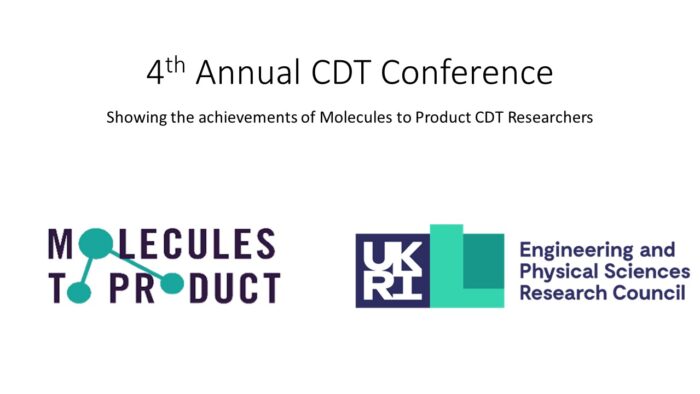CDT Annual Conference
The EPSRC Centre for Doctoral Training in Molecules to Product 3rd Annual Conference took place on Wednesday 10th and Thursday 11th July 2024, at The Village Hotel North, Leeds.
Please click below to view our conference flyer with agenda details:
Molecules to Product Conference Flyer 2024
Speaker Biographies
Dr Pia Müller – AstraZeneca

Dr. Ing Pia Müller is a German Automation Engineer at AstraZeneca Sweden working in the iLAB in the group of Michael Kossenjans as senior scientist on lab automation.
Pia got her PhD in Chemical Engineering from the Eindhoven University of Technology and worked before joining AstraZeneca in May 2023 as a PostDoc in the group of Richard Bourne and Thomas Chamberlain at the University of Leeds on automation and self-optimisation of chemical reactions in flow.
Her research background places her at the interface between chemistry, chemical engineering, and data science. Having experienced academic and industrial research she focusses on automation as a tool to streamline processes and provide better data for optimisation.
Professor Richard A. Bourne – University of Leeds

Professor Richard A. Bourne is currently a Professor of Digital Chemical Manufacturing at the University of Leeds. He completed a PhD under the supervision of Prof. Martyn Poliakoff, CBE, FRS. He is now a Royal Academy of Engineering Research Chair working on the development of new sustainable processes with focus on continuous flow routes to pharmaceutical and fine chemical products. His group is based within the Institute of Process Research and Development (IPRD) at the University of Leeds, a joint institute between Chemical Engineering and Chemistry. Research is supported by EPSRC, Catalysis Hub, Dial-A-Molecule, Horizon 2020 Funding (ProPAT and IbD), AstraZeneca, UCB Pharma, Syngenta, Royal Academy of Engineering and Dr. Reddy’s Laboratories
Professor Yoselin Benitez-Alfonso – University of Leeds
 Professor Yoselin Benitez-Alfonso is a Professor in Interdisciplinary Plant Sciences and a UK Research and Innovation Future Leader Fellow at the University of Leeds, UK. She leads a team researching plants cell communication and cell walls with the aim of devising applications in biotechnology and biomaterials that address global challenges in food security and environmental sustainability. Last year, Yoselin co-founded the Black in Plant Science Network (https://blackinplantscience.org/) and became the 66th Black Female Professor in the UK. She received the ‘Education and Academic Leader of the Year’ Forward Ladies award and the UKRI Impact Award for ‘Advancing Research Culture’ in 2023.
Professor Yoselin Benitez-Alfonso is a Professor in Interdisciplinary Plant Sciences and a UK Research and Innovation Future Leader Fellow at the University of Leeds, UK. She leads a team researching plants cell communication and cell walls with the aim of devising applications in biotechnology and biomaterials that address global challenges in food security and environmental sustainability. Last year, Yoselin co-founded the Black in Plant Science Network (https://blackinplantscience.org/) and became the 66th Black Female Professor in the UK. She received the ‘Education and Academic Leader of the Year’ Forward Ladies award and the UKRI Impact Award for ‘Advancing Research Culture’ in 2023.
For more details on Yoselin’s research and the team, visit https://benitezalfonsolab.leeds.ac.uk/ or https://astbury.leeds.ac.uk/people/yoselin-benitez-alfonso/. You can contact Yoselin at Y.Benitez-Alfonso@leeds.ac.uk or in social media at Twitter/X @YoselinBenAlf and LinkedIn.
Professor Andrew Bell – University of Leeds
 Professor Andrew Bell was educated at the University of Birmingham, UK (BSc Physics, 1978) and the University of Leeds (PhD Ceramic Science and Engineering, 1984). He has been Professor of Electronic Materials at the University of Leeds, School of Chemical and Process Engineering since 2000. He previously spent almost 15 years in industrial research posts and 4 years as a Senior Scientist in the Ceramics Laboratory at EPFL, Switzerland.
Professor Andrew Bell was educated at the University of Birmingham, UK (BSc Physics, 1978) and the University of Leeds (PhD Ceramic Science and Engineering, 1984). He has been Professor of Electronic Materials at the University of Leeds, School of Chemical and Process Engineering since 2000. He previously spent almost 15 years in industrial research posts and 4 years as a Senior Scientist in the Ceramics Laboratory at EPFL, Switzerland.
He has undertaken research on a wide range of topics in ferroelectric and dielectric materials, encompassing basic science, materials processing, structural & electrical characterisation and device physics, including pyroelectric materials and devices, microwave dielectrics and piezoelectrics. He has published over 200 papers with a total of more than 6000 citations.
From 2000 onwards, his research focussed almost exclusively on piezoelectric materials, particularly on those with capabilities beyond those of PZT. In 2011 he founded Ionix Advanced Technologies Ltd to exploit the new high temperature piezoelectric compounds emerging from his research group.
Prof. Bell was elected a Fellow of the Royal Academy of Engineering in 2016 and was elevated to Fellow of IEEE in 2019. He was awarded the Verulam Medal of the Institute of Materials in 2014. He has received the IEEE’s Ferroelectrics Recognition Award (2012) and Robert E Newnham Ferroelectrics Award (2022). His work on understanding the property enhancement mechanisms in Sm-doped piezoelectric ceramics won the American Ceramic Society’s Edward C Henry award for 2021. He is currently the 2023 IEEE-UFFC Distinguished Lecturer in Ferroelectrics.
Mark S'ari
 Mark completed undergraduate degree in Nanotechnology at the University of Leeds in 2014. His subsequent PhD was sponsored by AstraZeneca and delved into using electron microscopy for analysis of pharmaceuticals. Mark's work, centred on low-dose transmission electron microscopy (TEM), aimed to detect subtle crystallinity within amorphous solid dispersions and explore novel microscopy methods.
Mark completed undergraduate degree in Nanotechnology at the University of Leeds in 2014. His subsequent PhD was sponsored by AstraZeneca and delved into using electron microscopy for analysis of pharmaceuticals. Mark's work, centred on low-dose transmission electron microscopy (TEM), aimed to detect subtle crystallinity within amorphous solid dispersions and explore novel microscopy methods.
Following his PhD, Mark assumed the role of an experimental officer in TEM to unravel intricacies in organic and inorganic samples. In 2021, he transitioned to Johnson Matthey, channelling his expertise in TEM, SEM, and FIB to characterise materials vital for clean air, fuel cells and catalyst technologies, propelling advancements in sustainable energy and catalysis.
Paramita Pal
 This is Paramita Pal, postdoctoral research associate at the University of Bath on the rubidium filled fibre-integrated technologies for next-generation mobile communications. While my PhD at the University of Leeds, I worked on the silicon photonics, in particular on the fabrication of doped silica-on-silicon with rare earth ions (erbium) to build planar waveguide platform for integrated waveguide amplifier (EDWA) and rubidium implanted silica for nonlinear up-conversion. My expertise includes fibre fabrication, ultrafast laser plasma doping (ULPD) technique, nonlinear optics, fibre and planar waveguide characterisation and FEM (Comsol multiphysics) analysis. My education as BSc and MSc in Physics is from Kolkata, India followed by research internships from EU and Singapore.
This is Paramita Pal, postdoctoral research associate at the University of Bath on the rubidium filled fibre-integrated technologies for next-generation mobile communications. While my PhD at the University of Leeds, I worked on the silicon photonics, in particular on the fabrication of doped silica-on-silicon with rare earth ions (erbium) to build planar waveguide platform for integrated waveguide amplifier (EDWA) and rubidium implanted silica for nonlinear up-conversion. My expertise includes fibre fabrication, ultrafast laser plasma doping (ULPD) technique, nonlinear optics, fibre and planar waveguide characterisation and FEM (Comsol multiphysics) analysis. My education as BSc and MSc in Physics is from Kolkata, India followed by research internships from EU and Singapore.
Aaron Brown
 Aaron is a graduate of the University of Leeds, completing his BSc Biology, Integrated MSc and PhD in Bioenergy and EPSRC Doctoral Prize Fellowship at Leeds. Aaron’s research interests involve bridging the gap between biology and engineering by utilising bio-based materials, driving towards a more sustainable future. Aaron currently works as a Knowledge Transfer Partnership (KTP) Associate between the University of Leeds and Unilever. This project focusses the use of biomaterials for developing novel sustainable packaging materials by implementing and embedding sustainability metrics within Unilever’s R&D approach.
Aaron is a graduate of the University of Leeds, completing his BSc Biology, Integrated MSc and PhD in Bioenergy and EPSRC Doctoral Prize Fellowship at Leeds. Aaron’s research interests involve bridging the gap between biology and engineering by utilising bio-based materials, driving towards a more sustainable future. Aaron currently works as a Knowledge Transfer Partnership (KTP) Associate between the University of Leeds and Unilever. This project focusses the use of biomaterials for developing novel sustainable packaging materials by implementing and embedding sustainability metrics within Unilever’s R&D approach.

